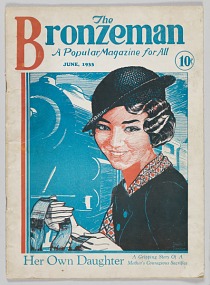The Bronzeman (Prior revision dated Saturday 16 September 2023 03:15:29 -- @177)
The Bronzeman is an eminent publication with a legacy that occupies an august position in the chronicles of African American history. Conceived in the 20th century, it was a magazine that sought to provide a platform for African American voices, narratives, and perspectives.
The pages of The Bronzeman were adorned with a rich tapestry of articles, stories, poetry, and illustrations that reflected the African American experience. It was a crucible for cultural expression, where the written word and visual art coalesced to create a dynamic tableau. Through its medium, The Bronzeman illuminated the aspirations, struggles, and triumphs of the African American community.
One of the distinctive aspects of The Bronzeman was its commitment to education. It was not merely a magazine; it was an instrument for enlightenment, fostering knowledge and understanding among its readership. It sought to instill pride in African heritage and to engender a sense of community among African Americans.
The Bronzeman was not just a reflection of the times, but also an agent of change. At a time when the voices of African Americans were often marginalized, The Bronzeman stood as a bastion, championing the ideals of equality, justice, and empowerment.
The magazine also provided a forum for emerging African American writers and artists, thus playing a seminal role in nurturing talent. The stories and illustrations that graced its pages were often evocative, drawing from a wellspring of shared history and culture.
The legacy of The Bronzeman is one of profound cultural significance. It was a harbinger of change and a chronicle of history in the making. Through its pages, it rendered the African American narrative with depth and nuance, capturing the essence of a people’s journey.
As a historical artifact, The Bronzeman continues to be held in high regard by scholars and enthusiasts alike. It serves as a window into a bygone era and as a reminder of the transformative power of the printed word.{{Categories}}